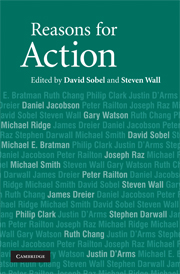Book contents
- Frontmatter
- Contents
- Notes on the contributors
- Acknowledgments
- 1 Introduction
- 2 Intention, belief, and instrumental rationality
- 3 Reasons: practical and adaptive
- 4 The explanatory role of being rational
- 5 Practical competence and fluent agency
- 6 Practical conditionals
- 7 Authority and second-personal reasons for acting
- 8 Promises, reasons, and normative powers
- 9 Regret and irrational action
- 10 Mackie's motivational argument
- 11 The truth in Ecumenical Expressivism
- 12 Voluntarist reasons and the sources of normativity
- Bibliography
- Index
12 - Voluntarist reasons and the sources of normativity
Published online by Cambridge University Press: 05 May 2010
- Frontmatter
- Contents
- Notes on the contributors
- Acknowledgments
- 1 Introduction
- 2 Intention, belief, and instrumental rationality
- 3 Reasons: practical and adaptive
- 4 The explanatory role of being rational
- 5 Practical competence and fluent agency
- 6 Practical conditionals
- 7 Authority and second-personal reasons for acting
- 8 Promises, reasons, and normative powers
- 9 Regret and irrational action
- 10 Mackie's motivational argument
- 11 The truth in Ecumenical Expressivism
- 12 Voluntarist reasons and the sources of normativity
- Bibliography
- Index
Summary
In virtue of what does a consideration provide a practical reason? Suppose the fact that an experience is painful provides you with a reason to avoid it. In virtue of what does the fact that it's painful have the normativity of a reason – where, in other words, does its normativity come from? As some philosophers put the question, what is the source of a reason's normativity?
This question should be distinguished from two others. One is: Which sorts of consideration ultimately provide practical reasons? That is, are practical reasons given by one's desires, by evaluative facts about what one desires, or by some hybrid of the two? This question concerns which considerations are the ultimate bearers of practical normativity. The question of source, by contrast, concerns that in virtue of which the considerations that ultimately bear normativity – whichever they are – do so. Another question is: What is the nature of normativity? That is, is normativity an irreducibly distinct justificatory force, a motivational force, or a volitional force? This question concerns normativity's essential features. The question of source, by contrast, concerns that in virtue of which something has normative force, whatever the nature of this force.
The questions of the source, bearers, and nature of normativity are logically distinct but naturally related. If normativity is a an irreducibly distinct justificatory force, then it is natural to think, as Plato did, that its ultimate bearers are irreducibly normative facts and that its source is an irreducible normative reality.
- Type
- Chapter
- Information
- Reasons for Action , pp. 243 - 271Publisher: Cambridge University PressPrint publication year: 2009
- 77
- Cited by

